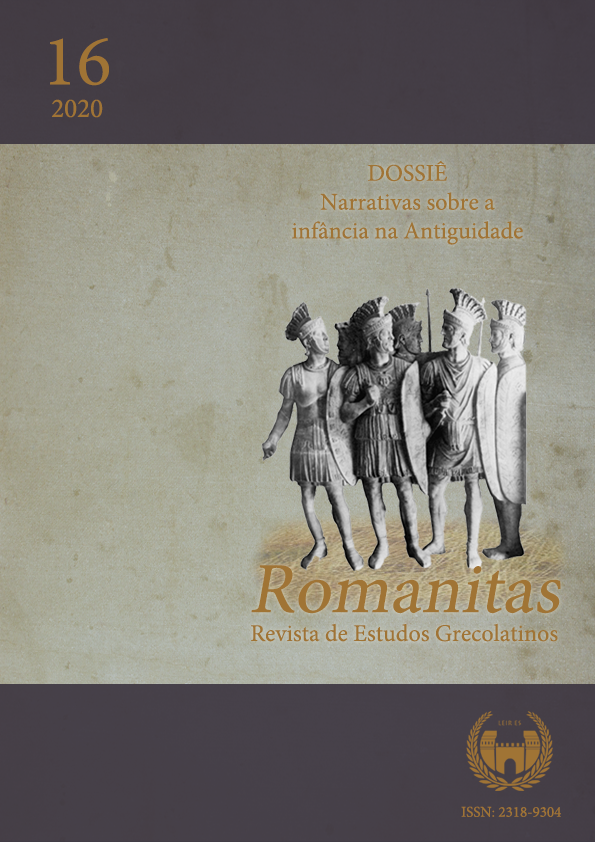O santuário de Elêusis na Ática a partir de relatos dos viajantes antiquaristas (do séc. XVII ao XIX): um estudo de caso sobre os usos da cultura material
DOI:
https://doi.org/10.17648/rom.v0i16.31513Parole chiave:
Antiquarianismo, Santuário de Elêusis, Cultura material, Relatos de viagem, Formação de identidades nacionaisAbstract
Os relatos de viagem escritos por antiquaristas são importantes fontes para historiadores e arqueólogos, pois resguardam registros textuais e pictóricos de paisagens, monumentos e artefatos que remetem à Antiguidade Clássica, além de descreverem populações locais e as dinâmicas entre as paisagens antiga e moderna. Eles também podem ser interpretados como registros de um longo processo histórico de sucessivas retomadas da Antiguidade Clássica por sociedades modernas. Nesse sentido, este artigo tem como objetivo apresentar o santuário de Deméter e Core em Elêusis, na Ática (Grécia), a partir dos relatos de viajantes em passagem pelo vilarejo entre os séculos XVII e XIX. Propõe-se enquadrar essas obras em seu contexto histórico, compreendendo sua relevância tanto como importante fonte histórica visual e textual quanto explorando as consequências polêmicas do manejo das antiguidades por alguns antiquaristas.
Downloads
Riferimenti bibliografici
Documentação textual
CLARKE, E. D. Travels in various countries of Europe Asia and Africa. London: Cadell and Davies, 1814.
LE ROY, J. The ruins of the most beautiful monuments of Greece. Introduction by Robin Middleton. Translation by David Britt. Los Angeles: Getty Publications, 2004.
SPON, J. Voyage d’Italie, de Dalmatie, de Grèce et du Levant, fait aux années 1675-1676. Amsterdam 1678. t. II. Disponível em: <https://archive.org/details/voyageditalieded02spon/page/n3/mode/2up>. Acesso em: 17 jun. 2020.
THE SOCIETY OF DILETTANTI. The Unedited Antiquities of Attica: comprising the architectural remains of Eleusis, Rhamnus, Sunium, and Thoricus. London, 1833. Disponível em: <https://digi.ub.uni-heidelberg.de/diglit/dilettanti1833/0003/image>. Acesso em: 17 jun. 2020.
WHELER, G. A journey into Greece in the company of Dr. Spon of Lyons. London, 1682.
Obras de apoio
ANDERSON, B. Imagined communities: reflections on the origins and spread of nationalism. Brooklyn: Verso Books, 1983.
BORDNAR, E. S. J. Cyriacus of Ancona and Athens. Brussels: Latomus, 1960.
BREMMER, J. Myths, mythology, and mythographers. In: BOYS-STONES, G; GRAZIOSI, B; VASUNIA, P. (ed.). The Oxford Handbook of Hellenic Studies. Oxford: Oxford University Press, 2009.
CHANDLER, R; REVETT, N. Travels in Asia Minor and Greece. Oxford: Clarendon Press, 1825. v. 2.
COSMOPOULOS, M. Bronze Age Eleusis and the origins of the Eleusinian Mysteries. Cambridge: Cambridge University Press, 2015.
DIÁZ-ANDREU, M. A World History of Nineteenth-Century Archaeology: nationalism, colonialism, and the past. Oxford: Oxford University Press, 2007.
DODWELL, E. A classical and topographical tour through Greece during the years 1801, 1805 and 1806. London: Rodwell and Martin, 1819.
DYSON, S. L. In pursuit of ancient pasts: a history of Classical Archaeology in the Nineteenth and Twentieth Centuries. New Haven/London: Yale University, 2006.
FAULKNER, A. (ed.). The Homeric Hymns: interpretative essays. Oxford: Oxford University Press, 2011.
HAMILAKIS, Y. The nation and its ruins: Antiquity, Archaeology, and national imagination in Greece. Oxford: Classical Presences, 2007.
JENKINS, I. Archaeologists and Aesthetes. London: British Museum Press, 1992.
JUDEICH, W. Athen im Jahre 1395 nach Beschreibung des Niccolò de Martoni. Athen: Athenische Mitteilungen, 1897, p. 423-438.
KELLY, J. M. The Society of Dilettanti: Archaeology and identity in the British Enlightenment. New Haven/London: Yale University Press, 2010.
KOHL, P. L. Nationalism and Archaeology: on the constructions of nations and the reconstructions of the remote past. Annual Review of Anthropology, v. 27, p. 223-246, 1998.
LENORMANT, L. Monographie de la Voie Sacrée éleusinienne, de ses monuments et ses souvenirs. Paris: Hachette, 1864.
LIPPOLIS, E. Eleusi, santuario dell’Impero. Bollettino di Archeologia Online, v. especial, p. 34-46, 2008.
LIPPOLIS, E. Mysteria: Archeologia e culto del santuario di Demetra ad Eleusi. Milano: Bruno Mondadori, 2006.
MENESES, U. B. de. A cultura material no estudo das sociedades antigas. Revista de História, n. 115, p. 103-117, 1983.
MESKELL, L. Introduction: Archaeology matters. In: MESKELL, L. (ed.). Archaeology under fire: nationalism, politics and heritage in the Eastern Mediterranean and Middle East. London: Routledge, 2002, p. 1-13.
MOMIGLIANO, A. As raízes clássicas da historiografia moderna. Bauru: Edusc, 2004.
MULRYAN, J. The Renaissance Mythographers. In: ZAJKO, V; HOYLE, H. (ed.). A Handbook to the Reception of Classical Mythology. London: Willey Blackwell. 2017.
MYLONAS, G. E. Eleusis and the Eleusinian Mysteries. Princeton: Princeton University Press, 2009.
MYLONAS, G. The Hymn to Demeter and her Sanctuary at Eleusis. Saint Louis: Washington University Studies, 1942.
PAPANGELI, K; CHLEPA, E. Transformations of the Eleusinian landscape antiquities and the modern city. Athens: Paul & Alexandra Canellopoulos Foundation, 2011.
PERISSATO, F. Elêusis no Império Romano: monumentalização do santuário e o culto dos Mistérios Eleusinos no Período Antonino. 2018. Dissertação (Mestrado em Arqueologia) – Programa de Pós-Graduação em Arqueologia da Universidade de São Paulo, São Paulo, 2018.
POLITIS, N. Traditions. Athens: P. D. Sakellariou, 1904.
REDFORD, B. Dilettanti: the Antic and the Antique in Eighteenth-Century England. Los Angeles: Getty Publications, 2008.
STUART, J; REVETT N. The Antiquities of Athens: measured and delineated by James Stuart and Nicholas Revett Painters and Architects. London: Thomas Bentham, 1816.
TRIGGER, B. História do pensamento arqueológico. São Paulo: Odysseus, 2004.
Downloads
Pubblicato
Come citare
Fascicolo
Sezione
Licenza
Copyright (c) 2021 Felipe Perissato

Questo lavoro è fornito con la licenza Creative Commons Attribuzione - Non commerciale - Non opere derivate 4.0 Internazionale.
a. Gli autori mantengono i loro diritti sugli articoli e concedono alla rivista il diritto di prima pubblicazione.
b. Gli autori sono autorizzati a fare accordi complementari per distribuzione non esclusiva della versione del testo uscito nella rivista, e a pubblicare l’articolo in un deposito istituzionale oppure in un libro, sotto forma di capitolo, a patto che sia menzionata la prima pubblicazione in questo periodico.
c. Gli autori sono autorizzati e stimolati a pubblicare e diffondere i loro articoli online, in sito elettronico proprio o in qualsiasi altro, dopo la prima pubblicazione nella rivista, e sempre facendo riferimento a Romanitas.
d. Gli articoli della rivista hanno una licenza CC BY 4.0 Deed Attribuzione 4.0 Internazionale (CC BY).




























